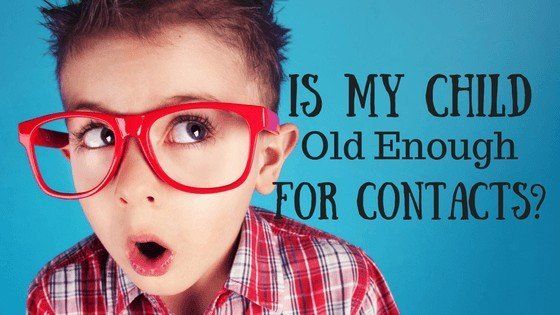How Old Does My Child Have To Be To Wear Contact Lenses?
Sometimes when it comes to kiddos, you’ll find yourself navigating through some gray areas. For example, determining how much screen time is too much - or how old they should be to watch that scary movie. These definitive numbers are so hard to pinpoint simply because no two children are the same. They all mature at different rates, and we as parents have to adjust accordingly. Fortunately, here are a few tips to help in one of those gray areas - figuring out if your child is ready for contact lenses.
Age Vs. Maturity
When determining if your child is old enough for contact lenses it is less about age and more about two key factors - maturity level and personal hygiene. Do you have to remind him or her to do chores or homework excessively? What about having to be reminded to brush their teeth or wash their hands? Some of this will come with the territory of being a carefree child. But in general if you feel you are having to “nag” or constantly remind them to take care of their responsibilities or to stay on top of hygiene, they might not be ready for contact lenses. On the other hand, if your child seems mature for their age and does a fair job of keeping up with their responsibilities, their success rate with contact lenses will be much better. The health of your child’s eyes will also rely heavily on making sure they stay on top of hygiene - specifically thorough hand washing.
Why Contacts?
So now that you have at least some guidance on the “when” regarding your kiddo and contacts, let’s take a look at a couple of the “whys” and eventually the “hows”.
Appearance
There are typically two main motivating factors parents and kids will consider when wanting to make the switch from glasses to contact lenses. The first is probably the most obvious - appearance. This is especially the case with pre-teens and teenagers who are at the age where appearance starts to matter more. Also, if a child has a prescription that is particularly high, contact lenses will eliminate the issue of having to wear heavy or thick glasses.
Contacts & Sports
The second most common reason for wanting to try contacts is the convenience when it comes to playing sports. There are actually quite a few benefits that come with making the switch:
- More comfortable use of helmets and safety gear
- Less risk for additional injury caused by broken frames
- Improved field of vision especially in the periphery resulting in faster reaction times
- No risk of glasses slipping down or falling off
- No distorted vision caused by fogging or splattering when playing in the rain, fog, or cold
Daily or Monthly Replacement?
Don’t worry, if you were a contact lens wearer in the early days of contact lens technology, there have been many advancements since the initial rigid gas permeable (rgp) lenses. Lenses are now thin, soft, flexible, and can provide your kiddo with great vision without sacrificing comfort.
Although contacts vary on how often they need to be replaced with a new pair (monthly, bi-weekly, etc), the most healthy and frequently recommended lenses are dailies. These are especially great for kids because they have very little upkeep. They will not have to worry about cleaning the lenses or storing them, instead they will simply throw them away at the end of the day and replace them with a brand new pair the next morning. Having a fresh set of lenses on the eyes each day will also lower your child’s risk for developing a contact lens related infection.
How To Get Started & What To Expect
So now that you have the low down, and you’re ready to make the big leap - what do you do? You will need to make sure your child has a comprehensive eye exam first to determine their prescription and to check the health of the eyes (see what to expect from your eye exam for more info). If they have never had an exam or are past due for their yearly check up, make sure when you are scheduling to let the office know they are interested in contacts to ensure the proper amount of time is set aside for you.
If your child has had an eye exam in the last few months, you should be able to call your optometrist’s office to make them an appointment specifically to be fitted for contacts (this might vary from office to office so you’ll want to check to make sure). Your doctor might want to take a few quick measurements including something called Keratometry which measures how flat or steep the front curvature of the eye is. This information is helpful when determining what size of contacts are needed.
Once the doctor has looked over all of the pertinent information and chosen a lens that will fit well and provide good vision and comfort, a pair of lenses will be placed on your child’s eyes. After the lenses have had a few minutes to settle, the doctor or technician will look at the lenses to double check the fit. At this point as long as everything looks good and vision is clear, your child will be taught how to properly insert, remove, and care for their new lenses.
Typically most doctors will let these lenses be worn in the real world for about a week in order for the patient (in this case your kiddo) to practice with insertion and removal and to get a good feel for whether or not they will meet their visual needs. At the follow up visit make sure your child is wearing his or her contacts to the appointment for a final assessment of the lenses and to make any minor adjustments to prescription or fit if needed. When everything is finalized you will be approved to order an annual supply of the contact lenses.
Warning Signs & Backup Glasses
Parents should feel free and are even encouraged to ask any questions regarding the wear and care of their child’s contacts. Your optometrist’s office should make you aware of any warning signs that could signal irritation or infection as well, such as severe redness or pain and discomfort. If you are ever concerned with the health of your kiddos eyes you should always contact your eye doctor. And when it comes to contact lenses, when in doubt - take them out! It would also be a good idea to have a backup pair of glasses just in case an infection does happen or if lenses are ever torn or lost.






